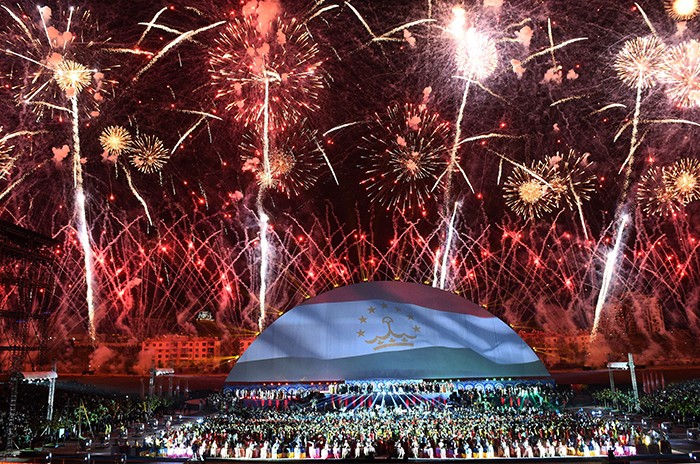Day of National Unity of Tajikistan is one of the main public holidays of the country. Every year on 27 June, Tajikistan celebrates a national holiday, the Day of National Unity, also known as the Day of National Reconciliation. It was established by the decree of the President of the Republic of Tajikistan, Emomali Rahmon, in 1998 in honor of the end of the five-year civil war in Tajikistan.
The Day of National Unity is intended to remind young generations at what cost peace was achieved in the republic and how important it is to preserve it and prevent internal conflicts in the future. The holiday is called the Day of National Unity, as it symbolizes the unity of the Tajik people, the solidarity in a single nation of residents of all cities, towns and villages of Tajikistan.
This is a holiday of reconciliation of the entire population, therefore, in all cities and regions of the republic, abroad, people congratulate each other, wish peace and tranquility. Self-confidence, selflessness, and patriotism of our people are a solid foundation for the development of the country.
On this day, the citizens of Tajikistan remember the events that played a key role in the history of the country. At all times, the main thing for Tajikistan was the unity of the people. This is the historical basis that connects our past, present and future.
And on this day, national harmony and the unity of society, based on moral values tested for centuries, are a prerequisite for the stable and dynamic development of Tajikistan, a calm and peaceful life of its citizens. The holiday symbolizes the unity of the people, the involvement of each of us in the fate of the country, and the desire for its further prosperity.
National Unity Day is one of the main holidays in Tajikistan and 27 June was declared a public holiday by the decree of the national parliament. The day marks the end of the bloody civil war (1992-1997), which lasted for five long years, and the reconciliation of the warring parties.
According to the established tradition, the main celebrations take place in any region of the country where President Rahmon plans to be on this day. The opening of new schools and kindergartens, commissioning of enterprises, plants and factories are usually timed to the holiday.
In other regions and in Dushanbe, National Unity Day is celebrated with concerts and mass festivities in parks of culture and recreation. Music sounds everywhere, creative teams perform, sports competitions are held, food fairs work. In the evening, festive concerts with the participation of famous performers are organized in the center of the city or village. National Unity Day is celebrated not only on the territory of Tajikistan, but also everywhere where Tajiks live.
Significance of 27 June as National Unity Day: It was on 27 June, 1997 in Moscow, at the ninth bilateral peace talks in the Kremlin, that the President of Tajikistan Emomali Rahmon and the leader of the United Tajik Opposition (UTO) Said Abdullo Nuri signed the ‘General Agreement on Peace and National Accord in Tajikistan’.
This important document put an end to the civil war and brought peace to the republic.
The two parties to the conflict that reconciled in Moscow, signed the following documents on 27 June:
- General agreement on the establishment of peace and national accord in Tajikistan;
Protocol of Understanding between the President of Tajikistan Emomali Rahmon and the head of the United Tajik Opposition Said Abdullo Nuri; - The Moscow statement of the President of Tajikistan Emomali Rahmon, the head of the United Tajik Opposition Said Abdullo Nuri and the Special Representative of the UN Secretary General Gerd D. Merrem.
- The General Agreement on the Establishment of Peace and National Accord in Tajikistan also includes 9 documents:
- Protocol on the Basic Principles of Peace and National Accord in Tajikistan;
Agreement between the President of Tajikistan Emomali Rahmon and the head of the UTO Said Abdullo Nuri following the meeting in Moscow on 23 December,1996; Protocol on Basic Functions and Powers of the National Reconciliation Commission;
Regulation on the Commission for National Reconciliation; Additional Protocol to the Protocol “On the Basic Functions and Powers of the National Reconciliation Commission”; Refugee Protocol; The Protocol on Military Problems; Protocol on Political Affairs;
Protocol on guarantees of implementation of the General Agreement on the Establishment of Peace and National Accord in Tajikistan.
According to the agreements concluded, all prisoners of war were released, all participants in the political and military confrontation were granted freedom and security. In addition, members of the opposition received 30 percent of seats in the government, leading positions in regional government bodies. Fighters of the opposition forces became part of the army of the republic. At the end of 1998, all refugees returned to Tajikistan from Afghanistan.

